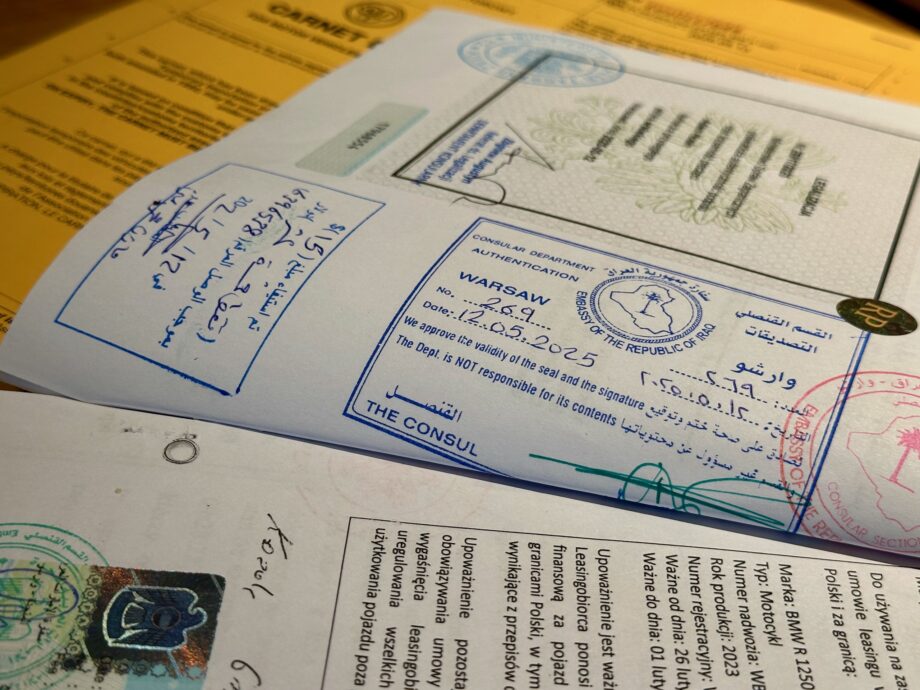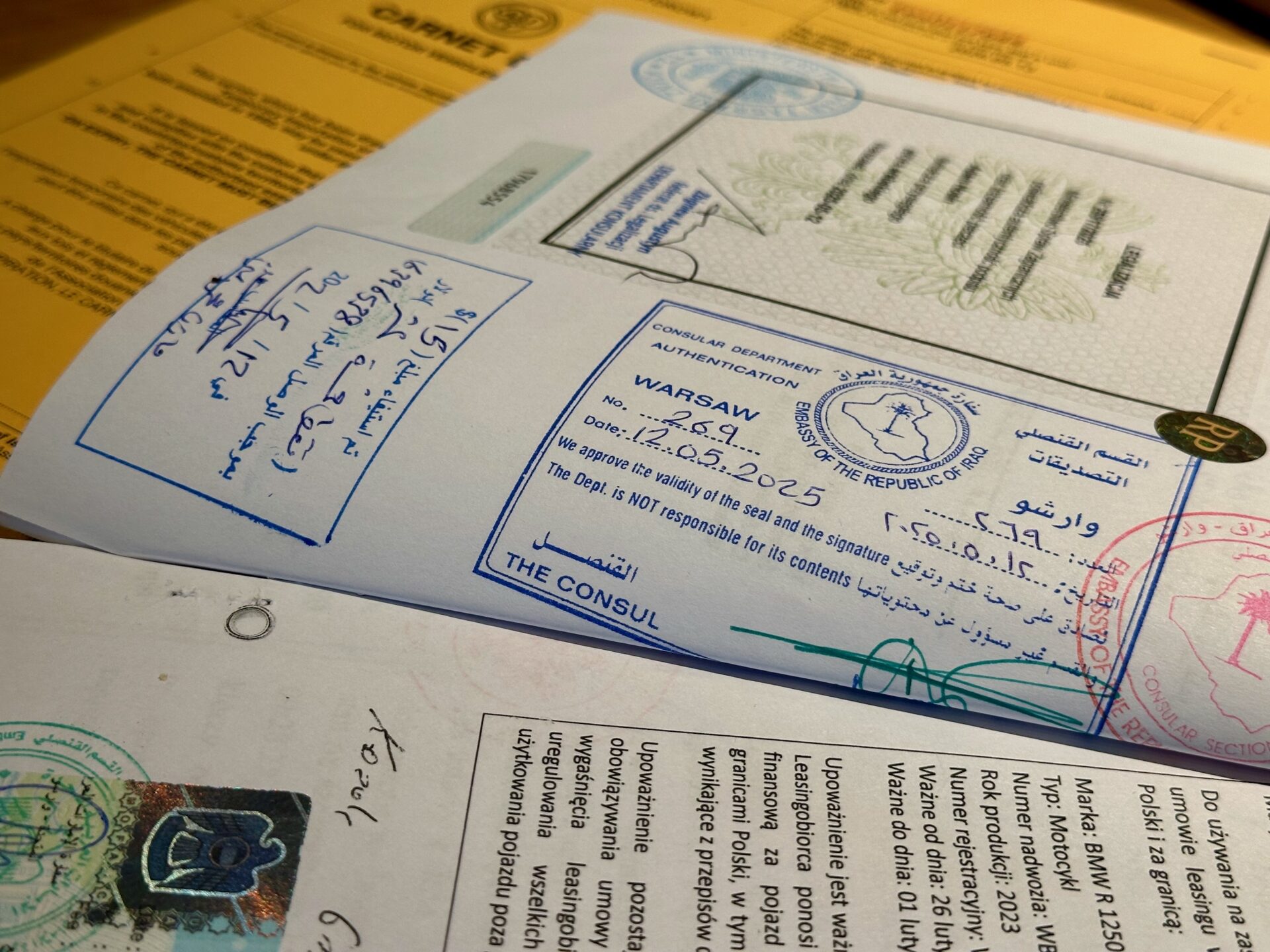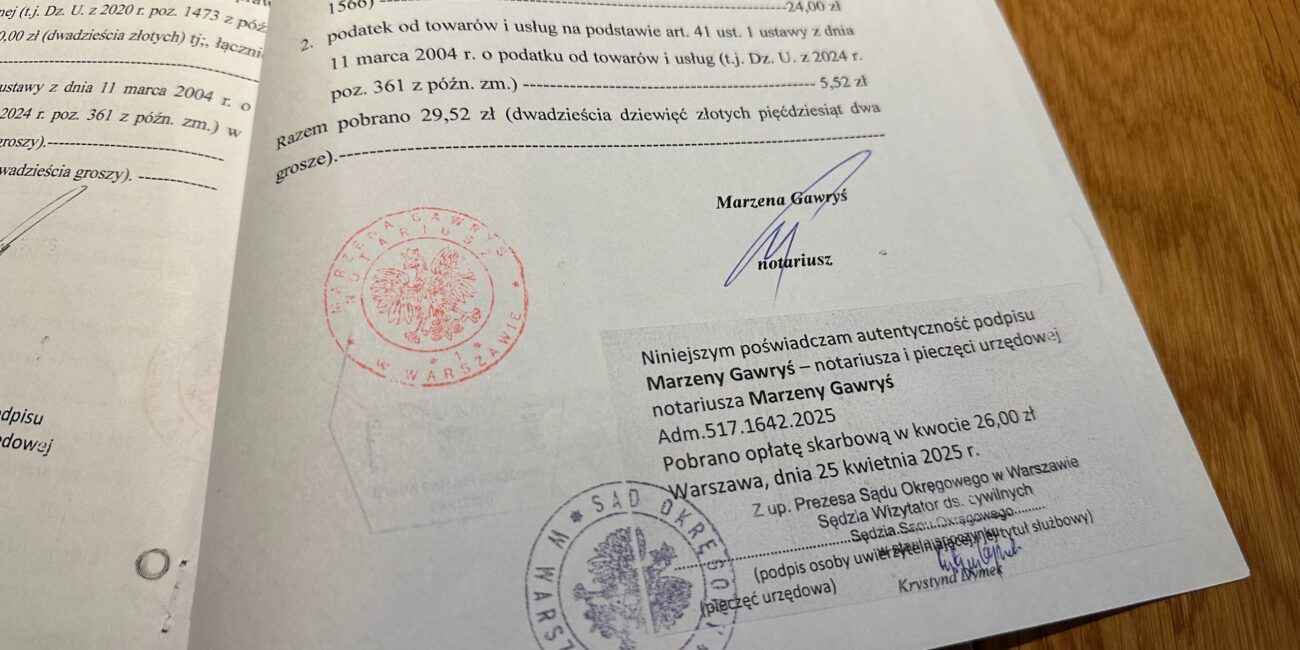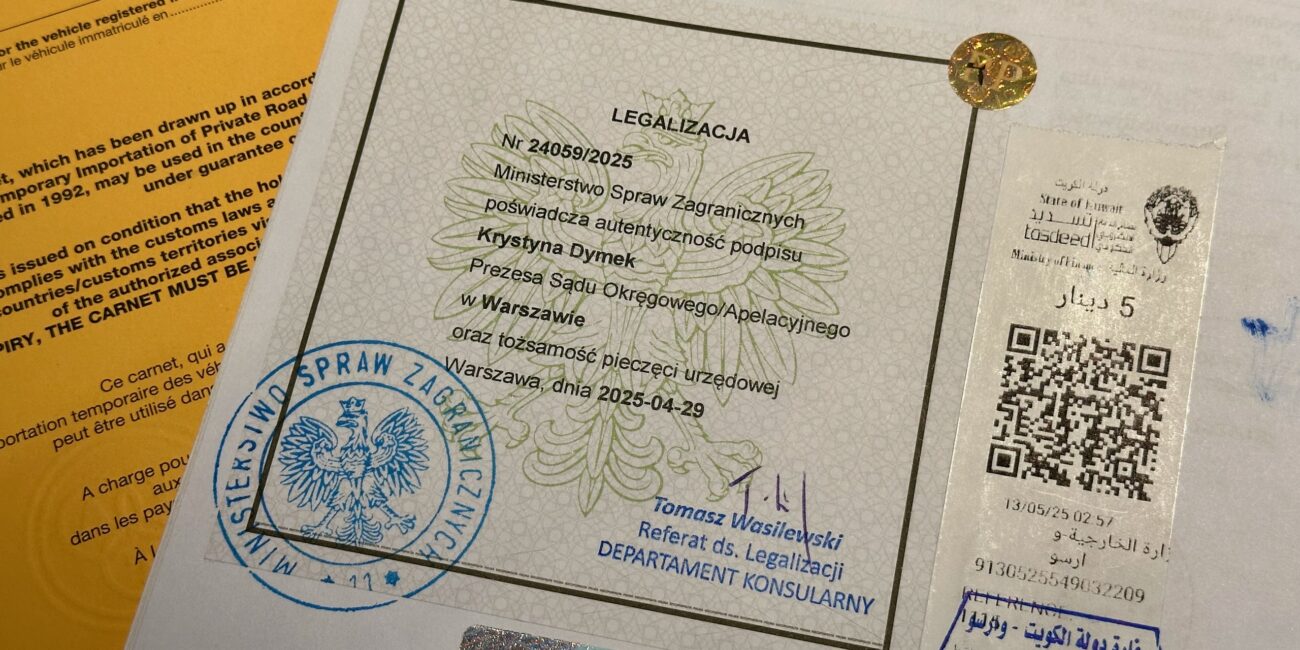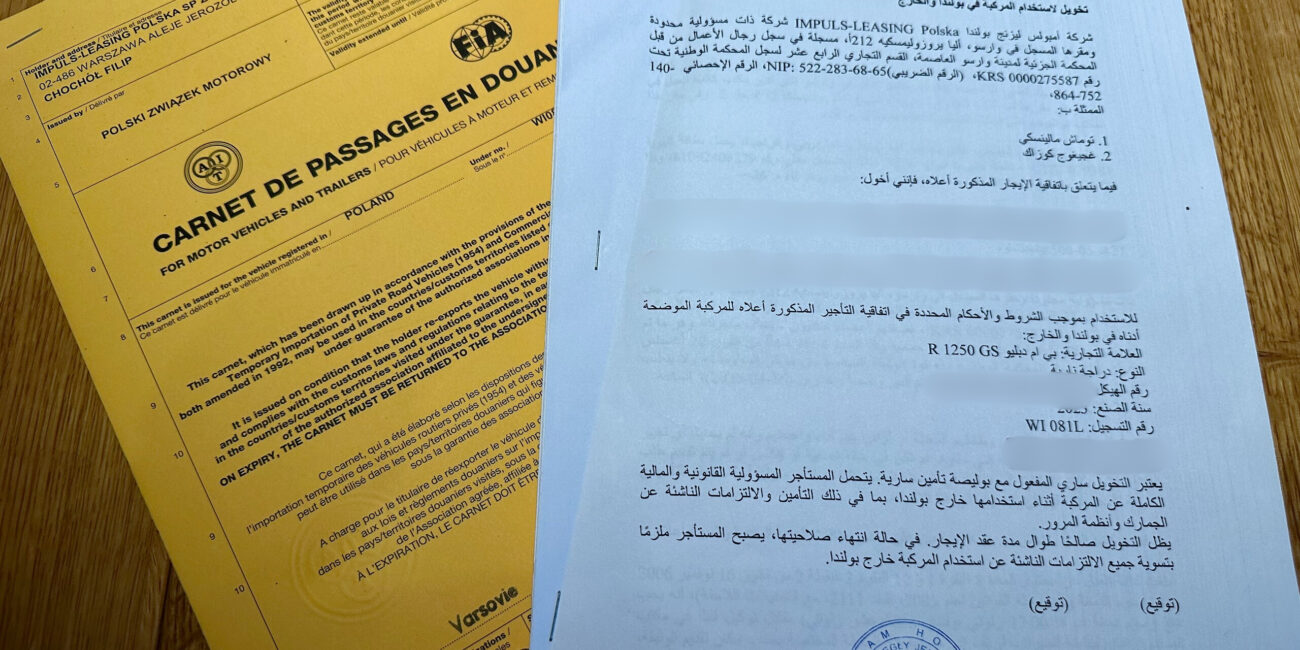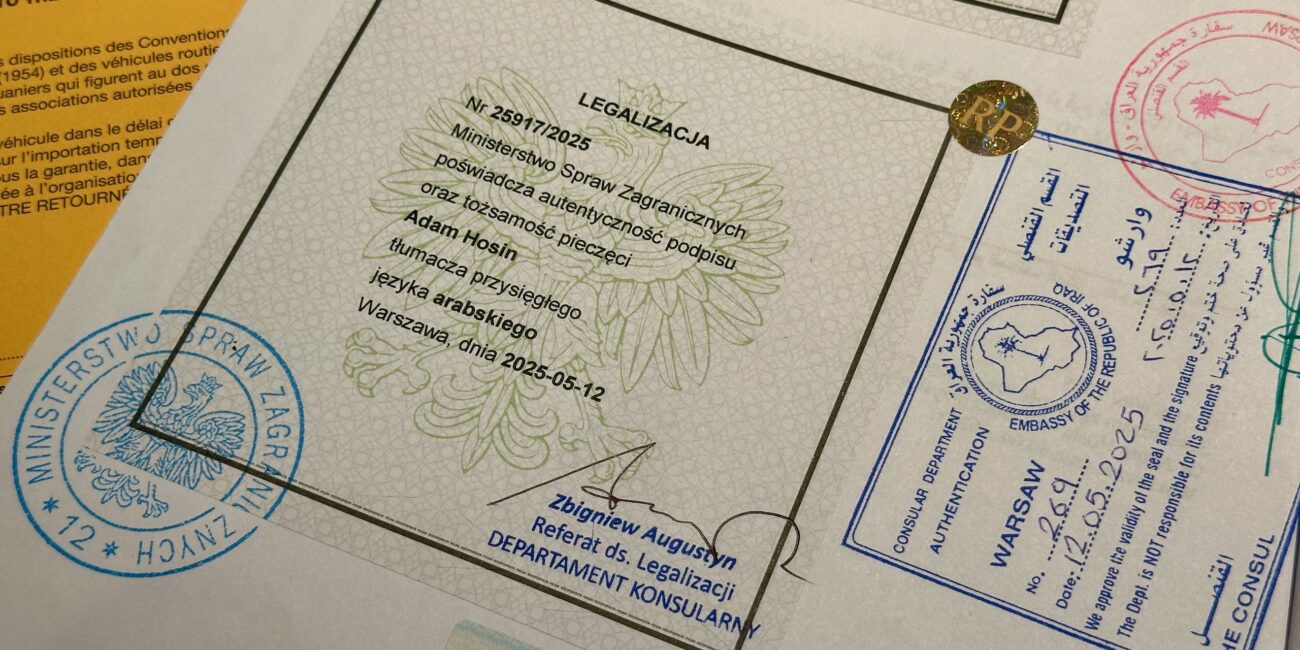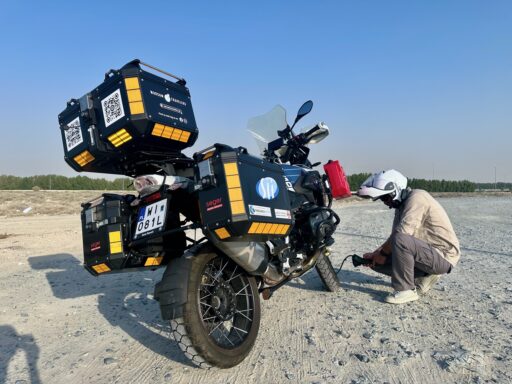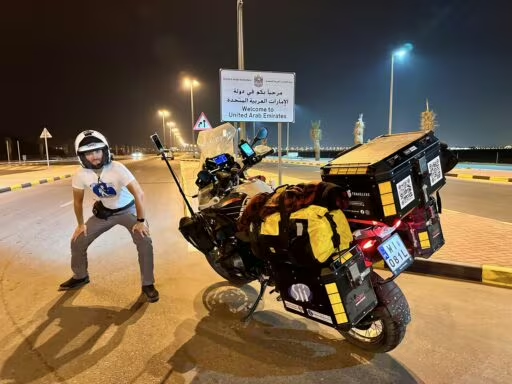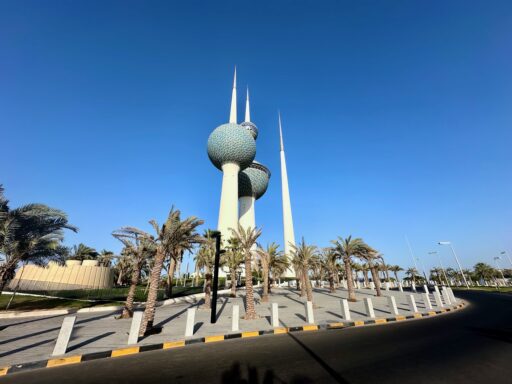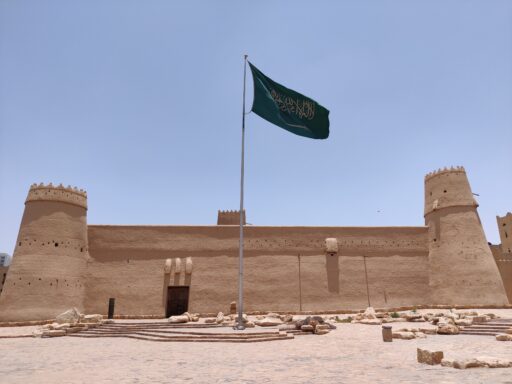This post is also available in:
Polski
Hello! 👋
Continuing our preparations for the motorcycle trip – yes, still on a leased bike. This time, we had to tackle the paperwork for Iraq. It’s not exactly a “top 10 dream destination,” but for us, it was the only reasonable route toward the Middle East.
Hopefully, this post will also help those of you planning to cross Iraq with a leased vehicle – provided, of course, you can convince your leasing company not to make a fuss about it.
Why is additional paperwork needed in Iraq?
Iraq – much like Turkey, which we wrote about earlier – is not part of the European Union, and things are further complicated by its political division into Federal Iraq and the autonomous Kurdistan Region. We’ll be entering on a federal visa (to avoid having to exit into Iran and re-enter Iraq), as traveling through the federal part of the country is not allowed on a Kurdish visa.
Are Iraqi border officials very strict? We don’t know from personal experience yet, but we preferred not to take any chances. In travel groups and various trip reports, we read that some people crossed the border with just the standard leasing authorization, and no one questioned it. Still, we didn’t want to show up unprepared. We contacted the Embassy of the Republic of Iraq in Warsaw to confirm exactly which documents were required. We’d rather have everything done “by the book” – maybe the border guards will just wave us through, but if anyone decides to check thoroughly, there will be nothing to complain about.
What documents to take with you before you leave?
Below is a list of the essential documents you really should have when entering Iraq with a leased motorcycle (plus a few notes based on our own experience).
- registration certificate,
- passport with federal e-visa – visa application is submitted on evisa.iq; fee is $160 + payment commission, decision usually in 48 h,
- Notarized authorization from the lease translated by a sworn translator into Arabic and legalized at our Ministry of Foreign Affairs and the Embassy of the Republic of Iraq in Warsaw,
- A copy of the lease agreement – just in case; in case you need it, it can be translated quickly at DeepL or ChatGPT.
- Photocopies of all papers – keep separate from the originals, in case of potential theft they will save your skin.
Officially, Iraq is listed among the countries that require a Carnet de Passages, although some motorcyclists have managed to cross without it – customs officers issued them a temporary import permit instead. Our rule of thumb: always take the carnet. It makes life easier and reduces the risk of unnecessary trouble. Make sure customs officers don’t accidentally stamp the “exit” section on the “entry” page – mistakes like that reportedly happen. You’ll need a CPD anyway if you plan to enter the UAE or Oman. We explained how to arrange one for a leased vehicle in this article.
Notarial authorization – step by step
A leased vehicle isn’t legally yours, so you need permission from the actual owner – the leasing company. If your contract doesn’t include a clause forbidding travel outside the EU, that’s good news, as the company has no formal reason to refuse. In practice, however, it all depends on the leasing provider – some will issue the document quickly, while others may hesitate or drag things out. And honestly, it’s hard to blame them.
The Polish Ministry of Foreign Affairs classifies Iraq as a country to which all travel is strongly discouraged. Leasing companies tend to look at this pragmatically – they worry the vehicle could be lost, and you might not be able to repay the remaining lease. That’s why not every company will be willing to authorize a trip to such a high-risk region.
What must be included in the document? The key is a clear statement confirming that you are allowed to use the vehicle outside of Poland – that’s what unlocks the entire process. The document must be signed by authorized representatives of the company (board members or appointed attorneys) in the presence of a notary. The cost is 24.60 PLN per signature. It’s worth requesting several copies right away – keep the original safely stored, and use the certified copies for the subsequent legalization steps.
After visiting the notary, you need to go to the District Court (Sąd Okręgowy) to legalize the notary’s signature. This step is mandatory – without it, the Polish Ministry of Foreign Affairs will not accept the document to complete the legalization process.
MFA – legalization and apostille on one copy
After legalizing the notary’s signature at the district court, the next step is to visit the MFA – Legalization Desk on Krucza Street 38/42 in Warsaw . It is here that the document gets the last Polish seals before translation.
It’s worth clarifying right away: there are two types of document authentication at the Ministry of Foreign Affairs:
- legalization sticker (used for countries outside the apostille system, such as Iraq, Kuwait and the United Arab Emirates),
- Apostille (for countries that have signed the Hague Convention, such as Oman and Saudi Arabia).
Normally, legalization alone would be enough, as Iraq is not a party to the Hague Convention and an apostille has no legal effect there. However, if you plan to use the same document in other Middle Eastern countries (such as Saudi Arabia or Oman), it’s worth doing both legalization and an apostille on a single certified copy. Why? Because the sworn translation must be done on the document in its final form – with all stickers and stamps exactly as it will later be presented to the embassies.
The process is straightforward: book an appointment through the online reservation system, pay 26 PLN for legalization and 60 PLN for the apostille. If you go in person, everything is done on the spot. If you send the documents by courier, expect to wait a few days, and it’s a good idea to insure the shipment.
This stage closes the Polish part of the paperwork – the document is ready for certified translation into Arabic.
Sworn translation into Arabic
After completing the Polish part of the legalization process – obtaining legalization and (optionally) an apostille at the Ministry of Foreign Affairs – the document must be taken to a sworn Arabic translator. A sworn translator is officially registered with the Polish Ministry of Justice, holds state certification, and uses an official seal. Only such translations are accepted by embassies and government offices.
In our case, we used the services of Dr Adam Hosin. The cost of translating this type of document generally ranges from 300 to 600 PLN net, depending on the length of the text. A big advantage was that everything could be done on-site – the translator immediately bound the translation together with the original certified copy (with legalization and apostille) and sealed the entire set with his official stamp.
This is very important, because the consular departments of Iraq, Kuwait or the Emirates will not accept the document if the translation is not stapled to the original.
Legalize the translation at the MFA and the Iraqi Embassy
The Polish part of the paperwork for the original document ends with legalization and an apostille at the Ministry of Foreign Affairs. However, the sworn translation is treated as a new, separate official document, which means the entire process must be repeated – legalization and an apostille must also be applied to the translation. Only then will the Embassy of the Republic of Iraq accept it.
After obtaining the stamps at the Ministry of Foreign Affairs, we contacted the Embassy by phone or email to inform them of our visit – no appointment was required. The embassy is located in Saska Kępa (Warsaw). A very friendly lady handles the process, and everything goes smoothly – legalization costs 15 USD, payable in cash only. The legalized document is issued immediately.
Practical tip: Iraqi stamps are quite large, just like the previous MSZ legalizations. On the last page of the translation, where the Polish stamps are placed, there’s space for a maximum of two embassy stamps. We managed to squeeze in three after some serious juggling, but it was really pushing the limits. That’s why we recommend preparing at least two copies of the translation if you plan to legalize the document in more than two embassies.
How much does it take and how not to go crazy?
The entire process mainly depends on how quickly the sworn translator can get the job done. In the best-case scenario, everything can be completed within two weeks, but if the translator is busy or the Ministry of Foreign Affairs or the embassy have longer waiting times, it can take up to a month. For us, the whole procedure – from the notarial signature to the stamp at the embassy – took two and a half weeks.
Keep in mind that the embassy does not verify the content of the document. Legalization at the embassy only confirms that the translator and the officials who previously stamped the document are authorized to perform such actions. The embassy takes no responsibility for whether Iraqi border officials will accept it – and neither do we. All we can do is share how the process looked for us. We’ll let you know how it went after crossing the border, but honestly… we don’t expect any problems. 😄
If you don’t have the time or simply don’t feel like running around offices, we can help you organize these documents in Poland. Just send us a message through the contact form on our blog – we can guide you through the process step by step or even handle it for you.
See you on the road! 🗺️ 🏍️

